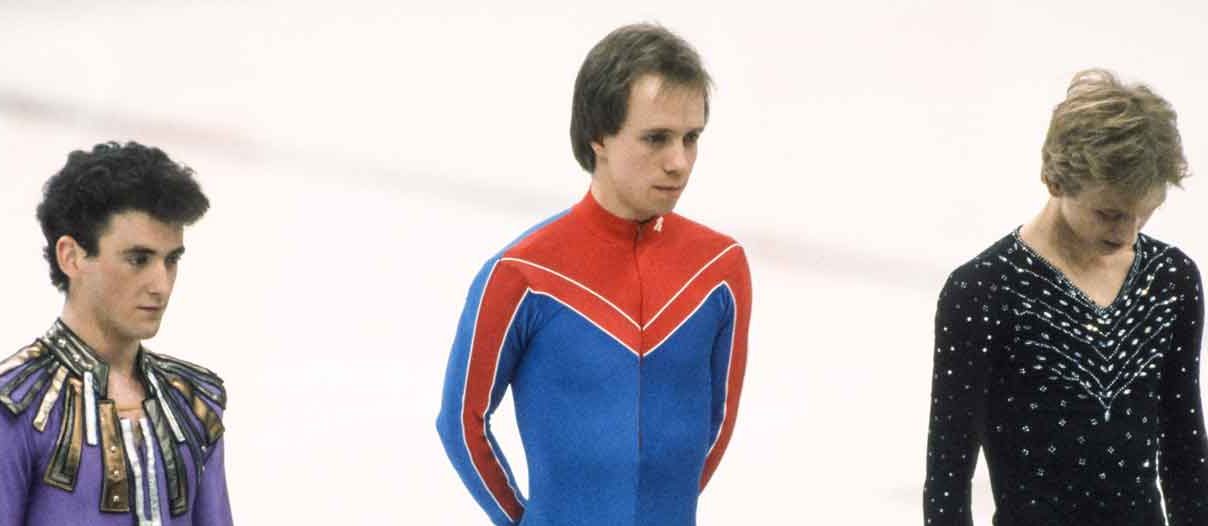Scott Hamilton Loses His Champion

His mother was his biggest cheerleader, regardless of whether he landed every jump or fell flat on the ice. How his mother’s death reshaped his life and career.
There’s an old poem — an ode from an adoptive mother to her child — that goes, “You didn’t grow under my heart, but in it.” From the moment Dorothy Hamilton adopted her son Scott, just weeks after his birth in August 1958, he began to grow in her heart. And he never stopped growing there.
Dorothy and her husband, Ernest Hamilton, loved Scott as sincerely and completely as if he were their own child. That love drove them halfway across the country, to hospital after hospital, searching for a cure to the mysterious illness that afflicted him in childhood. It compelled them to sell their home to finance his burgeoning skating career. “They were trying to trim money wherever they possibly could. My mom didn’t buy any clothes for five, six years. So she really sacrificed for her kids, and especially me,” he says.
His mother was his biggest cheerleader, regardless of whether he landed every jump or fell flat on the ice. So it was so much more heartbreaking when, just as Hamilton was on the cusp of his first major competitive victory, his mother was gone.
YOU MIGHT ALSO LIKE: Scott Hamilton Beats the Odds and Keeps Winning
Taking cancer in stride
Hamilton was only a teenager when his mother was diagnosed with breast cancer. She took the news — and her treatment — in stride, continuing to work toward her master’s degree and raise three children, all while undergoing chemotherapy.
She also continued to support his skating career, cheering him on from the stands as he skated to victory in the 1976 junior national championship. “My mom had had her left breast removed and most of the inside of her left arm, and she had chemo and she was wearing a wig, and she was trying — the surgery was still relatively fresh — so she was trying not to bump into people at this rink,” Hamilton says. “But she still had a twinkle in her eye.”
Dorothy managed to find an upside to even the most debilitating side effects of her treatment. She’d say, ‘“Oh, this chemotherapy is wonderful, I finally lost all this weight! Oh this chemotherapy is just — I’ve wanted to quit smoking all these years and I had no desire. This chemotherapy is so phenomenal. I hated my hair and these wigs are so much easier!”’ Scott recalls. His mother was his role model. Her stoicism would shape the way he’d eventually cope with his own cancer diagnosis.
Despite Dorothy’s positive outlook, her cancer prevailed. The 1977 nationals was the last competition in which she’d ever see her son skate.
The center of his universe
When his mother died later that year, Hamilton felt lost. “She was the center of my universe. She sacrificed everything for me. How do I mourn her? How do I do this?” he asked. He could have easily fallen into a pattern of self-destructive behavior. Instead, he devoted himself wholeheartedly to skating to honor his mother’s memory.
Hamilton had slacked off in his training over the previous year. Now it was time to get serious. He called his coach, the legendary Carlo Fassi, and told him things were about to change. “I said, ‘I just want you to know that there’s a different kid coming back. And I want you to be ready, because I’m going to be all guns ablaze.’” Fassi wasn’t persuaded. “He goes, ‘Sure. Yeah, yeah.’ He didn’t believe me for a second,” Hamilton says.
YOU MIGHT ALSO LIKE: Our section about common people doing uncommon acts, #IGiveBeyond
True to his word, Hamilton returned to his training with renewed fervor. He learned two new skating programs and earned a spot on the 1978 World Championship team. “Now all of a sudden I’m in the conversation,” he says.
Though his mother had been gone for several months, she never left his side. “She was always with me in spirit. She was kind of my reality check. ‘How did I do today?’ ‘Ah — you could have done better.’”
When his legs were too tired to execute a jump, her voice was in his ear, urging him on. “I was accountable to her. I wouldn’t be late. I’d show up and work hard every session,” he says. “I just was really hungry to shake off some of the guilt that I had that I was such a failure while she was alive.”
1984 Olympics
Dorothy Hamilton was also there with her son on a February day in Lake Placid, N.Y., as he carried the U.S. flag in the opening ceremony of the 1980 Winter Olympics. And she was there with him four years later, when he skated his way to an Olympic Gold Medal in Sarajevo, Yugoslavia. “I think about the fact that she always thought, ‘You’re going to the Olympics.’ She was just dreaming. But the fact that it happened…”
For four years — from 1980 through 1984 — Hamilton never lost a U.S. or world figure skating competition. “You know how often that happens? It hasn’t happened since,” he says incredulously. Those four years would cement his position as one of the all-time greatest male figure skaters in history.
Hamilton attributes his winning streak to honesty, integrity — and a lot of hard work. “Everything’s possible. You just need to put the time in, and maybe you need a lucky break here and there. But it’s all just putting the time in,” he says.
Updated:
May 30, 2017
Reviewed By:
Christopher Nystuen, MD, MBA